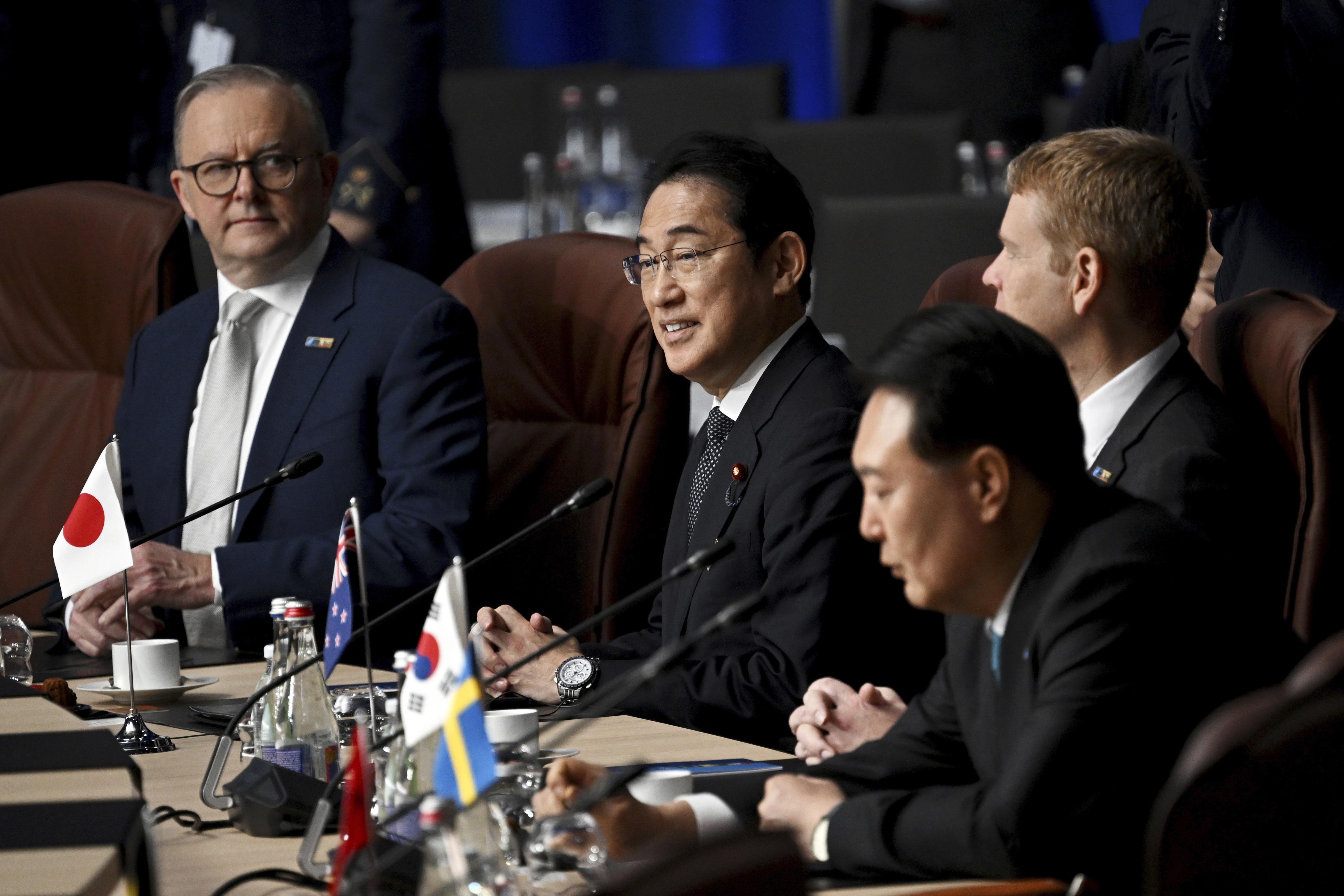China raises strong objection amid calls for further review by expert agencies
 (Form left) Australia's Prime Minister Anthony Albanese, Japan's Prime Minister Fumio Kishida, New Zealand's Prime Minister Chris Hipkins, and South Korean President Yoon Suk Yeol, attend a meeting of the North Atlantic Council with Partner Nations at a NATO summit in Vilnius, Lithuania, July 12, 2023. (PHOTO / AP)
(Form left) Australia's Prime Minister Anthony Albanese, Japan's Prime Minister Fumio Kishida, New Zealand's Prime Minister Chris Hipkins, and South Korean President Yoon Suk Yeol, attend a meeting of the North Atlantic Council with Partner Nations at a NATO summit in Vilnius, Lithuania, July 12, 2023. (PHOTO / AP)
South Korean opposition lawmakers continued their protests on Wednesday in Japan over the controversial plan to dump the Fukushima nuclear-contaminated water as South Korean President Yoon Suk-yeol met with Japanese Prime Minister Fumio Kishida on the sidelines of the NATO summit in Lithuania, with the release on their agenda.
Yoon requested the dispatch of South Korean experts to monitor the planned nuclear water release during his summit on Wednesday with Kishida, Reuters reported.
Democratic Party lawmaker Wi Seong-gon, who was among the group of lawmakers from the opposition parties, said in a joint statement at a news conference in Tokyo that more expert organizations should take part in reviewing Japan's plan in addition to the United Nations nuclear watchdog. The statement was also supported by eight members of Japan's parliament.
When asked about the South Korean government's position, Wi said Seoul needed to relay the voices of people who were concerned about and opposed to the plan. "We are doing our best to persuade the government and this is why we are visiting Japan right now," Wi said.
The Yoon administration has walked a fine line in its stance on Japan's discharge proposal, as it tries to improve ties with Tokyo while recognizing domestic unease about the discharge plan, Reuters commented.
Pacific Island leaders will review a report by the International Atomic Energy Agency on Japan's proposed Fukushima nuclear-contaminated water release before deciding a position, Cook Islands Prime Minister Mark Brown said on Tuesday after meeting with the IAEA's director-general Rafael Grossi.
There were "some divergent views" among Pacific Island leaders on the issue, Brown, chairman of the Pacific Islands Forum, told media after the meeting, according to Cook Islands Television.
Chinese Foreign Ministry spokesman Wang Wenbin said in a daily briefing on Wednesday that the Fukushima nuclear water dump plan "will cause uncertainty and risk for the collective interests of the global community". China and the Pacific Island countries have serious concerns over Japan's ocean discharge plan and firmly oppose Japan's attempt of shifting nuclear pollution risks.
Wang said on Tuesday that it is against common science to put the nuclear-contaminated water and the water released from normally functioning nuclear power plants in the same category.
'Save it for them'
"If some people think that the nuclear-contaminated water is safe to drink or swim in, Japan should save it for those people instead of releasing it into the sea," he told a news conference.
His remarks came after the IAEA chief reportedly said on several occasions that one could drink or swim in the "treated water" from Fukushima and that the "treated water" is as harmless as the water discharged from nuclear power plants in other countries.
Citing recent media coverage, Wang said one can find that the IAEA's safety review has indeed been controversial. Experts who participated in the review have expressed views different from the final report. That is an indisputable fact.
Meanwhile, Arjun Makhijani, president of the Institute for Energy and Environmental Research in Maryland, said he has raised his concerns with the IAEA as part of the Pacific Islands Forum expert panel, the Fiji Times reported on Tuesday.
As a nuclear engineer who has half a century of expertise, he criticized the IAEA for ignoring its own principle of justification in its report on Japan's planned dump.
"The IAEA has abandoned its responsibility to review the justification of actions, even though it is part of the fundamental safety principles," Makhijani said. "The IAEA is refusing to acknowledge its responsibility, and basically abandoning the countries of the Pacific region to whatever mercies the government of Japan might offer them."
The IAEA is set to meet with Pacific leaders next week, The Fiji Times said.
The Tokyo Electric Power Company has yet to confirm a start date for dumping the nuclear-contaminated water as Japan aims to start to do so around this summer.


